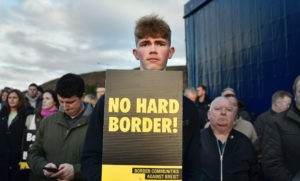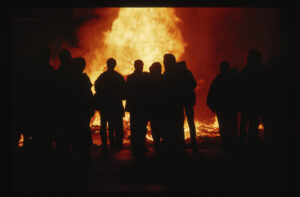On the eve of his coronation, King Charles peered out from behind a giant union flag at the very loyalest of his subjects gathered below. Around 200 people had gathered outside the Co-op on West Belfast’s staunchly Loyalist Shankill Road to watch the huge new mural of the king being unveiled. As a sword-bearing honour guard in scarlet uniforms stood to attention, a piper skirled a plaintive-sounding national anthem as the flag came down, revealing the new king above his coronation oath to inviolably maintain the true Protestant religion.
Hesitantly at first, then loudly, the crowd sang God Save The King, clapping and waving their own flags. “We’re part of the Loyalist Shankill Road, you’ll not get a place anywhere that’s more loyal to the crown,” Janet McGregor, a middle-aged woman wearing a slightly unsettling King Charles mask and coronation robes told me. “We had to fight hard to stay part of being Britain, so we did, whereas those over there now [in Britain], they don’t seem to care. Look at Scotland, trying to get away. Until the death, isn’t that right? You’ll have to kill us first.”
But the passionate attachment of working-class Loyalist communities to the United Kingdom and the monarchy, so exotically performative to mainland eyes, is not reciprocated by Westminster. The Conservative party relied on the support of the DUP, the province’s largest Unionist party, to push Brexit through, but Brexit has had the unintended consequence, for many Unionists who supported it, of bringing down their own devolved government and further isolating Northern Ireland. On the 25th anniversary of the Good Friday Agreement, a poll revealed that 62% of Unionists oppose the return of devolved government until Johnson’s Northern Ireland Protocol is completely scrapped.
But London wants to move on, and is increasingly impatient with the DUP’s refusal to return to Stormont, warning that abstention from power sharing is “the biggest single threat to the union”. In an effort to restore the relationship between Westminster and Brussels, the Sunak government recently deployed the new king’s regal stardust to obtain the Windsor agreement, a ploy condemned by the DUP’s Nigel Dodds as politicising the monarchy, and resented by local Loyalist activists.
“The Windsor agreement is the Belfast agreement [Good Friday Agreement] renamed, it’s the same,” Julie Davidson of the ACT NGO, created to integrate former UVF paramilitaries into civilian life, told me, “and that was a blindside to put that Windsor in there. People in the community feel exactly the same as me, it’s a failed agreement. I voted for the Good Friday Agreement 25 years ago, but would I do it over again? No. Bring the whole lot down.”
If power sharing resumed in Stormont, Sinn Fein would lead Northern Ireland’s government as the country’s largest party, as King Charles himself affably noted to Sinn Fein’s Vice President and Northern Ireland leader, Michelle O’Neill. The oddly warm relationship between the King and the republican leader is remarkable, not least because his own beloved uncle was assassinated by the IRA. Yet Charles has worked hard to advance normalisation between Britain and Ireland — his 1995 visit to the Republic was the first official visit by a royal since the country’s independence, laying the groundwork for the Queen’s historic 2011 visit — and it may already be paying dividends.
“I’m very proud the way he’s met with Republicans,” Janet’s friend Jacqueline told me beneath the mural, “I’m proud that he done that. It showed them’uns [Nationalists], I’d love them’uns to take their seats in the House of Commons, if they’re genuine about trying to move on, that’s something that would have to be asked.” Yet Charles’s outreach to a Nationalist community which rejects his role has already met with new reciprocation from Sinn Fein, eager to position itself as the natural party of government for all of Northern Ireland. Michelle O’Neill’s surprise announcement that she would attend the coronation — as a mark of respect for Northern Ireland’s Unionists — was well received by some Loyalists gathered under the mural. “I feel sorry about the hunger strikers’ families to be honest with you,” says Jacqueline. “Them people died for their cause and the next minute she goes away to London and wants publicity for votes.”
Indeed, it’s perhaps O’Neill’s own Nationalist powerbase that looks most sceptically at her attendance of the coronation. On nearby Northumberland Street, the Peace Gates — the optimistically-named metal barriers built to keep the two communities apart — divide the Protestant Shankill from the Catholic Falls Road. Murals to dead UVF volunteers and the fallen of the First World War Ulster Division suddenly give way to memorials to dead republican militants and lurid expressions of support for various Third World liberation movements. At the An Chultúrlann centre, an Irish-language cultural hub, Gerry Carroll of the Republican socialist People Before Profit party told me that O’Neill’s attendance was a misstep. “Somebody who classes themselves as a democrat should not be endorsing and entertaining the most reactionary elements in British politics,” he told me, “so I think it’s a real shame that Michelle O’Neill and others have endorsed that rotten institution. As soon as they offered that, it wasn’t enough for the DUP, they were clamouring for Union Jacks on every public building, so Sinn Fein are conceding ground to the DUP and others’ narrative.”
On West Belfast’s Catholic Divis Street, two PSNI officers sat bored in their parked patrol car watching an anti-coronation protest stretched out along the road. Pádraic MacCoitir, former Republican prisoner and organiser for the far-Left nationalist Lasair Dhearg faction, was giving a speech railing against the “imperialist rule” of a “parasite” king, but reserved his greatest ire for Sinn Fein. “Twenty-five years after the Good Friday Agreement, we find ourselves faced with the spectacle of two former Republicans standing in front of a king, acting as Viceroys of Empire,” he told the 50 or so demonstrators, waving red flags and placards saying “Not Our King” in Irish and English as beeping cars rushed past. “Their presence is an endorsement of the very forces that oppressed and terrorised our people for centuries, this is a betrayal of everything that we have fought for.” But asked whether his anger was shared in the wider community, MacCoitir was more equivocal. “Well obviously Sinn Fein, politically — you can see all the posters about — they’re very strong,” he told me. “It’s wrong what they’re doing, it’s completely and utterly wrong. But will it affect them in the forthcoming council elections? I don’t know. I really don’t care to be honest, but it could. Who knows?”
But it’s unlikely that Sinn Fein, now the largest party on both sides of the Irish border, will be electorally troubled by O’Neill’s gesture: if anything, it marks a growing confidence that history is on their side. Back on the Shankill Road, there’s a weary sense that Northern Ireland’s Nationalists are now on top, have better PR and London’s ear. The sight of Sinn Fein’s leadership seated so prominently at the ceremony highlights that the party has now become, in its own way, part of a Westminster establishment whose authority it doesn’t formally recognise. “The Republican movement seem to have better spokespeople and people [in Westminster] are more sympathetic towards them,” Matt, a drinker in the Shankill’s Rex Bar, bedecked with Union Jacks and portraits of the king, told me. “I don’t think it matters if it’s a Conservative government or a Labour government, if it suited them, they’d do away with the six counties and be happy with a united Ireland, they see it as a burden. It’s like an unrequited love, it doesn’t matter what we do, we’re taken for granted and ignored.”
This sense of disaffection will only grow as Northern Ireland braces for savage cuts in Government services to fill an £800m budget black hole. Already the poorest part of the United Kingdom, with the country’s worst transport infrastructure and longest NHS waiting lists, now the province’s Department for Infrastructure is warning it will be forced to limit road maintenance and turn off street lights to save money. The greatest perceived trump card for the Union, Northern Ireland’s superior public services to the Republic, are now threatened by the looming budget cuts, the effects of which will further entrench political divisions within Unionism over power sharing. With the DUP blocking Stormont, and the Unionist vote divided over the way forward, even on the Shankill there’s a grudging respect for Sinn Fein as efficient political operators.
“The streets here is alive with rats, them politicians knock on your door for votes and then you’ll never see them,” Steven, a young local, told me as he puffed on a cigarette outside the Shankill’s Royal Bar. “I’ve seen people in Shankhill Road going to Sinn Fein for housing problems, because at least they’re working, and they seem to resolve the problems. I’ve known many Protestant people go down to Catholic councillors to resolve their problems, it’s shameful to be doing it but it’s the only way.” Steven’s friend Nicola, an NHS worker, agreed. “There’s no government here,” she told me, “I’ve never seen Belfast so run down. Why are we paying for them to sit at home? We’re all working and they’re getting paid for nothing, and now they’re going to turn off our street lights.”
Divided between those who want Stormont restored and those who want it abolished entirely, working-class Unionists in Belfast are on the back foot, and increasingly disillusioned with Northern Ireland’s dysfunctional political system. For all that the coronation provided an opportunity for the community to coalesce and demonstrate their passionate attachment to the Union and the monarchy, their fractured politics leave them voiceless in Westminster, and an irritation to a British Government whose reciprocal loyalty seems ever more uncertain. O’Neill’s presence at the crowning of the man she hopes will be Northern Ireland’s last king was also a coronation of her own, establishing Sinn Fein as the province’s next party of government, and reframing Loyalist attachment to the monarchy as a harmless cultural quirk of a people she is destined to lead rather than a meaningful political identity. In Northern Ireland, so misleadingly similar to mainland Britain and yet so utterly different, the glittering spectacle of the Coronation took place in a Westminster that looks to be moving ever further away.
Disclaimer
Some of the posts we share are controversial and we do not necessarily agree with them in the whole extend. Sometimes we agree with the content or part of it but we do not agree with the narration or language. Nevertheless we find them somehow interesting, valuable and/or informative or we share them, because we strongly believe in freedom of speech, free press and journalism. We strongly encourage you to have a critical approach to all the content, do your own research and analysis to build your own opinion.
We would be glad to have your feedback.
Source: UnHerd Read the original article here: https://unherd.com/



